SEO
Can Google Detect AI Generated Content?
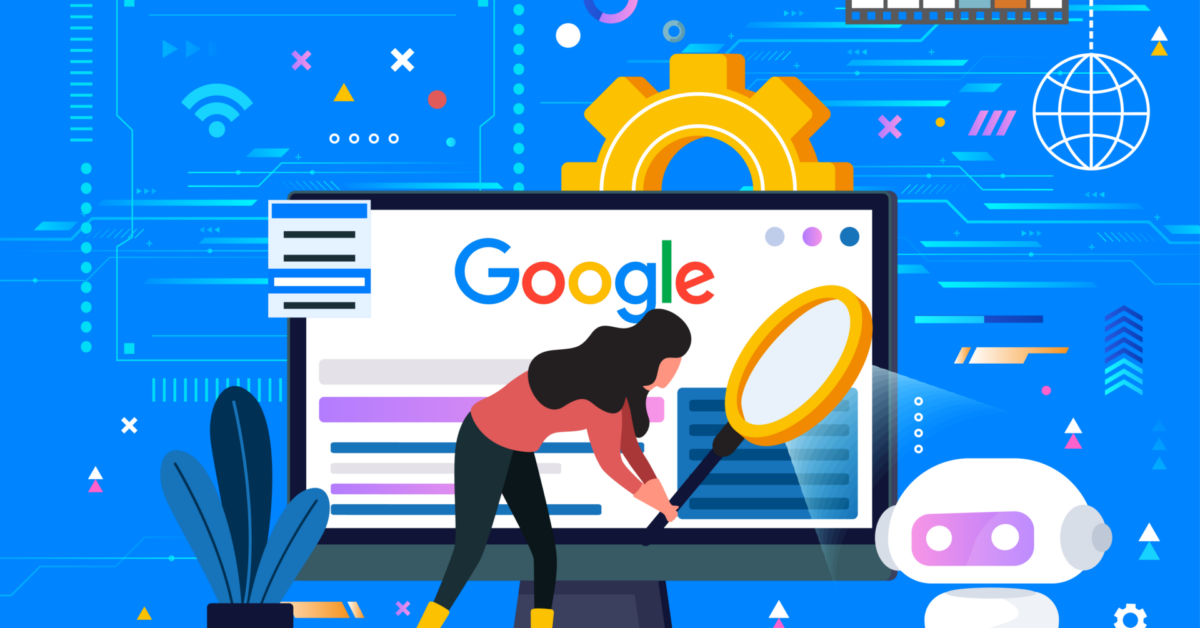
Just when we thought that we could use everything AI to write all of our content, developers went and dropped AI writing detectors on us, too.
The creators of ChatGPT themselves released one just a few weeks ago, amidst new Google statements and updates on the whole issue of generative AI and content.
It’s looking hard out there for these writing tools—but can engineers really develop a way to detect whether text has been by AI writers and conversational chatbots? Can Google detect AI-generated content? And, should you be worried about penalization if you’ve been using these tools yourself?
Let’s get into what this all means for your content production, and what you can do to avoid getting hit by Google’s algorithm.
Is AI Content Bad for SEO?
Yes, AI-written content can be bad for your SEO.
Google has said multiple times in the past that purely AI-written content goes against its guidelines. We’ll get into why and how it can be a problem for you later on.
Google also has a long, long history of using and developing AI tech. So, it’s safe to say that they do have ways to tell if your articles are written by an AI tool.
Why AI-Generated Content Goes Against Google’s Webmaster Guidelines
Is using AI assistance in writing explicitly prohibited by Google’s Webmaster Guidelines? No. But, there are guidelines that strongly condemn ‘spammy automatically-generated content.’ Specifically, they call out any article written by AI for the “primary purpose of manipulating ranking in search results,” which they state is a violation of our spam policies.
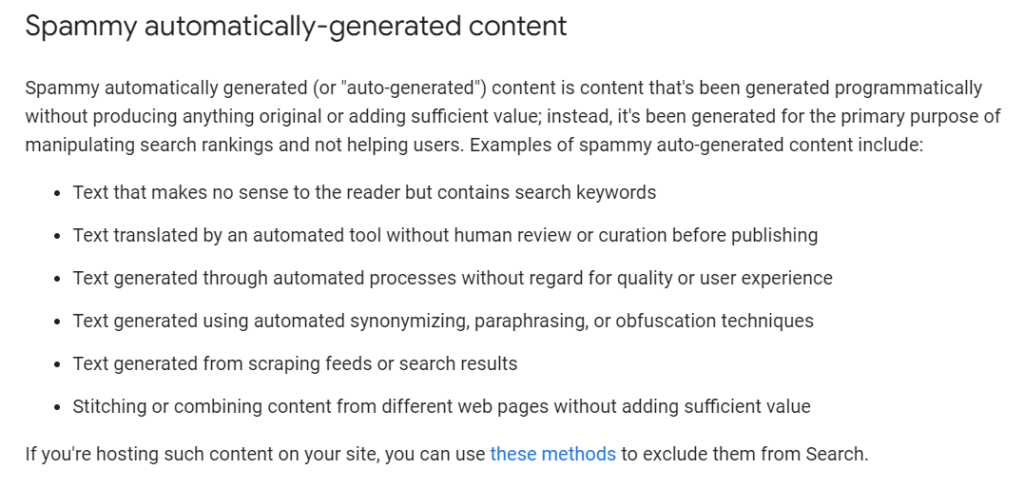
This is a mistake you can commit if you’re trying to churn out the most content simply to climb the ranks as fast as possible.
So, it’s not that AI-generated content is, by default, something that Google will punish you for. But, if you’re just mass publishing content using AI, then it may ultimately hurt your rankings, rather than help.
Danny Sullivan—a renowned SEO expert and representative of Google—made this clear in a past statement:
“We haven’t said AI content is bad. We’ve said, pretty clearly, content written primarily for search engines rather than humans is the issue. That’s what we’re focused on. If someone fires up 100 humans to write content just to rank, or fires up a spinner, or a AI, same issue…”
How Can Google Detect AI Content?
To understand how Google can detect AI content, it’s important to understand how AI writing tools work.
Jasper, ChatGPT, and other similar AI use a process called Natural Language Generation (NLG) to generate copies and responses. NLG uses algorithms, trained on a large corpus of data, to generate human-like text.
Google on the other hand can use machine learning algorithms to learn the different signals in content—such as text structure, grammar, and syntax in the text. This will help it detect patterns in the content that are indicative of AI generative writing.
In short, if it falls within a structure that is noticed by the algorithm, Google can flag it.
This is entirely possible because AI writing is missing the natural variation, nuance, and complexity found in human writing. Plus, AI writing tends to be repetitive, and the facts and data they present may also be outdated or misinformative.
So, Can Google Detect AI Content?
Yes, even if it’s been run through your AI tools a couple of times. It can possibly even detect it if it sounds very well-written.
It might not be noticeable while skimming through the text your tools generate, and it might even read naturally—and yet, it can be detected.
That’s not to say that Google’s algorithm is 100% accurate, though. When asked in an interview if Google was able to automatically detect the difference between human and AI content, Google’s John Mueller responded “I can’t claim that. However, if the web spam team sees anything that is automatically generated, they will take action.”
So, it’s clear that there is no foolproof way of detecting AI-generated content, at least not yet. As AI technology and machine learning continue to develop, it’s safe to say that they will develop a highly reliable way to detect and penalize it.Other AI Writing Detectors
As I mentioned earlier, there are several AI detection tools out there that can catch AI-generated content.
The one developed by Open AI, which they’re temporarily calling “AI Text Classifier,” is just the latest in the long line of tools you can use. Originality AI is a premium tool that charges you 0.1 cents per credit and checks your content for both originality and AI. Another option is AI Content Detector from Writer, which you can use for free—though only for 1,500 characters at a time.
I tried them both myself. I first asked ChatGPT to write me an article:
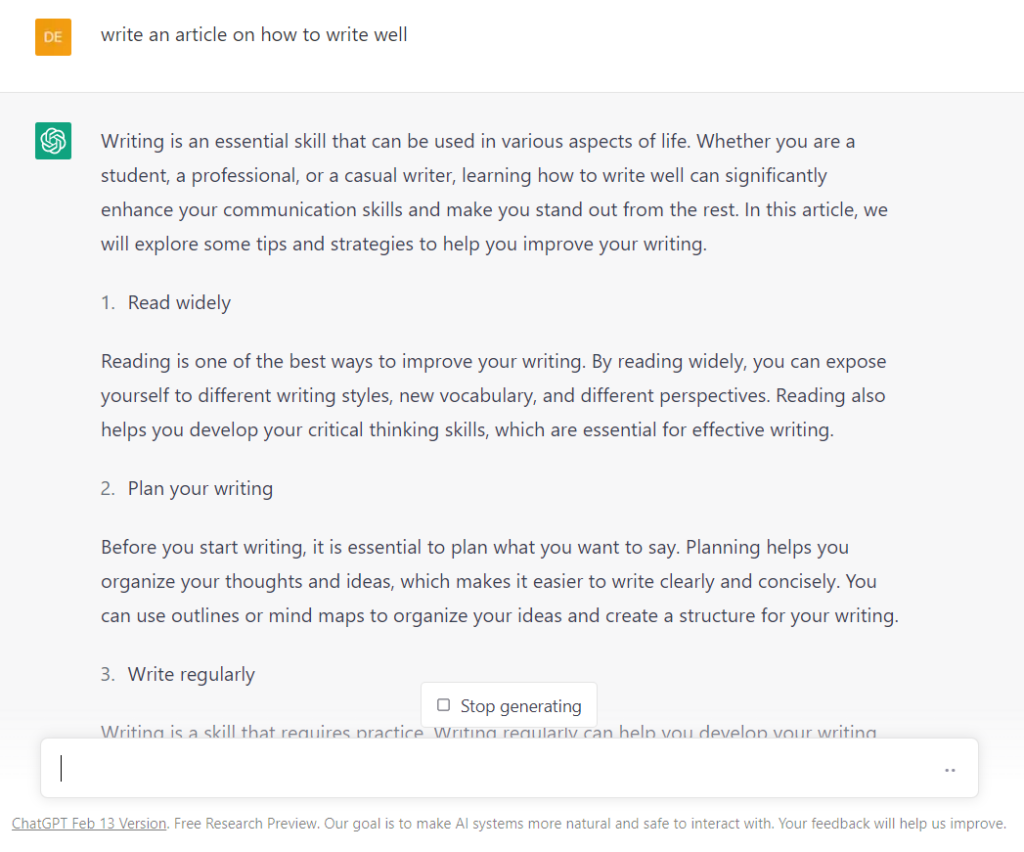
Then, I put it into the AI detector tools, without any edits:
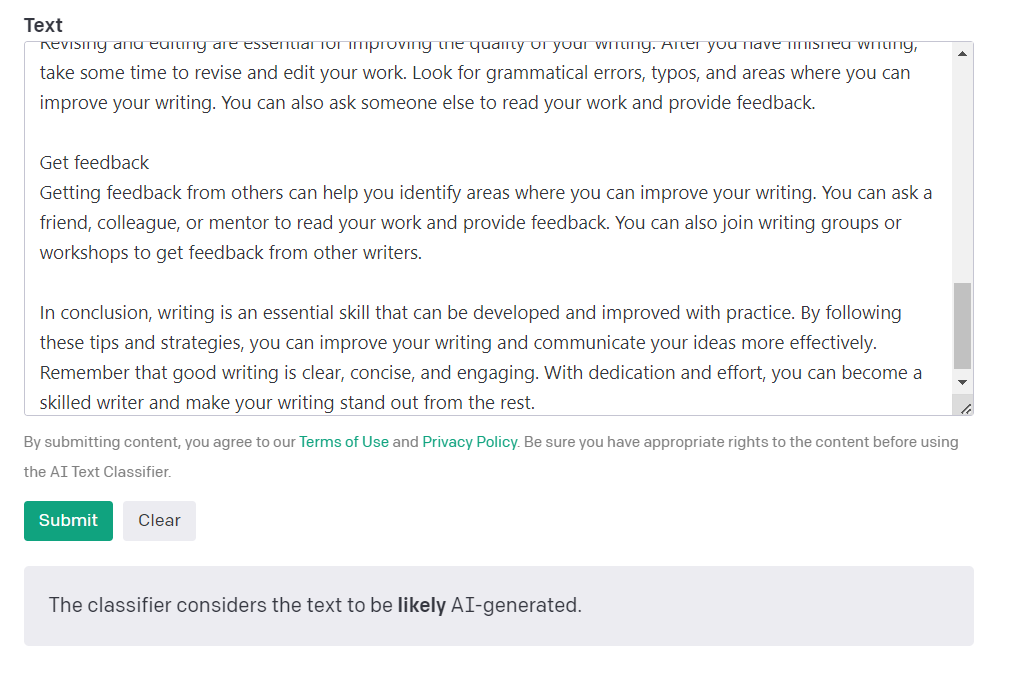
Here’s what AI Content Detector had to say:
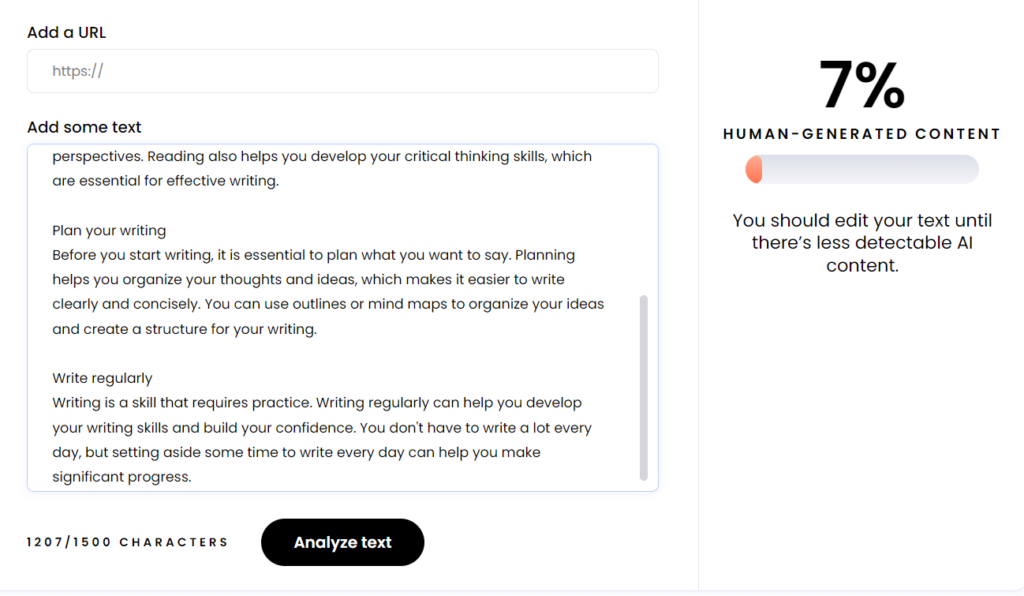
So, these tools seem pretty reliable in finding purely AI-written content.
Should You Stop Using AI for Your Content?
“I’m using an AI writing tool, should I be worried?”
A lot of people are asking this question now. After all, with the introduction of ChatGPT in late 2022, and the explosion of AI software adoption, we all saw the incredible capabilities of AI. Suddenly, we all had free access to a tool that could replace a lot of the legwork and money that usually goes into content writing.
How could we not use this technology in our SEO strategies, when it was so good?
And now, months later, many are wondering if their AI-written content puts them in danger of a Google penalty.
So, should you be worried if you used an AI writing tool for your site? The answer is—it depends.
The situation as I see it is this: when you use things like ChatGPT to make content, you either publish it as is, or edit it before doing so.
The first puts you in a bad position because you’re putting out bad content. It will be downgraded by Google because it’s low-quality content that doesn’t provide a helpful, valuable experience for readers.
Why? Because tools like this only scrape and remake content that was fed to them. They do not provide anything novel, since you’re not adding your expertise, your thoughts, or your interpretations to the content.
So the name of the game now is knowing how to use these tools efficiently, while still adding quality (and a human touch) to your content. Always offer that expertise to it that makes it valuable to readers.
How Does This Affect AI-Generated Content?
You might still be skeptical, and feel safer if you’re writing content purely without AI.
However, what you should be worried about is choosing the best content writing tools, and making sure to use them properly. After all, given how much time and money you can save with this in your toolbox, it’s worth taking the risk—with a few guidelines set in place.
Google even supports this (in a way), in their updated page on AI-generated content:

On the same page, they also said this: “This said, it’s important to recognize that not all use of automation, including AI generation, is spam. Automation has long been used to generate helpful content […] AI has the ability to power new levels of expression and creativity, and to serve as a critical tool to help people create great content for the web.
This is in line with how we’ve always thought about empowering people with new technologies. We’ll continue taking this responsible approach, while also maintaining a high bar for information quality and the overall helpfulness of content on Search.”
So no, you don’t have to stop using your tools. But you might have to revisit how you’ve been using them.
For starters, I suggest working with the right team. If the people using them are complete novices, then it might do your content more harm than good.
Why? Because if they don’t know how to use these tools properly, then they might end up producing low-quality content that will, at best, be ignored by users (and at worst, get penalized by Google). Either way, the result is something you need to avoid.
Plus, if they keep churning out that kind of content on your site, you’re probably going to see a dip in your traffic and engagement.
On the other hand, if you’re able to train them to use these tools in such a way that creates great content for your audience with less time and effort spent, then it will become an extremely valuable asset for your site. In the right hands, it’s a powerful thing.
So if you’re going to use an AI writing tool, invest some time in learning how to use them, and figure out what you should avoid doing with your content creation.
What to Do When Using AI for Content Creation
Here are a few things to keep in mind:
- Check the writing style, tone, flow, and grammar of the generated content. Nothing turns off a reader more than something that is poorly written—or sounds odd.
- Use the tool to generate the bulk of the text. You could start with an outline, and ask for a paragraph or two for each point. This will make it easier for you to target as many relevant talking points as possible with less effort on your end.
- Provide clear guidelines. Without proper instructions, AI tools can struggle to generate quality content. If you don’t do this, you’ll probably waste time trying to re-generate the content you’re looking for.
- Understand what prompts you can use. AI tools are programmed to respond a certain way to prompts, which can help you generate content in different formats, or for a dedicated focus. Knowing what prompts to use in a given situation can help cut down the time you spend trying to create the right content with your tools.
- Your content should be relevant and informative. Don’t just push out articles and blogs for the sake of it. If it isn’t relative and informative, it has little to no value for any reader.
- Make sure to add your own take on the content—add in your expertise, your thoughts, and your comments on the matter. This human touch not only displays your knowledge of the topic but also transforms the content into something that will be uniquely yours.
What to Avoid When Using AI for Content Creation
And here’s what to avoid doing completely with your tools:
- Relying completely on AI for your content. As I said earlier, doing this will do you more harm than good, especially since the tools (and Google’s algorithm) can sniff out purely AI-written content.
- Substituting AI-generated content for human creativity. Use these tools to cut down on writing time so you and your team can invest in something more valuable—your human creativity, insight, and expertise. Always insert that into your writing.
- Using AI for complicated, niche topics. Depending on your industry, you might not always be able to use it for your content. While AI is pretty sophisticated in what it can answer, it often cannot answer questions that require inference, a nuanced understanding of language, or a deeper understanding of multiple topics.
- Keyword stuffing. This is an SEO content best practice as old as time. When you stuff your writing full of keywords, it will make your work sound spammy, and may even get you penalized by Google for being spam content.
- Forgetting to proofread and fact-check. Don’t expect AI to be perfect. Always proofread and fact-check. Any data, statistics, or facts given by your tool should be checked for accuracy.
Conclusion
Can Google detect AI-generated content? The answer is yes, but that doesn’t mean that you have to stop using it in your SEO.
Though several AI writing detectors are out there—many of which are free to use—it’s clear to me that AI-generated content won’t be going away anytime soon. In fact, there are several ways for it to be used ethically for SEO.
With the proper guidelines, you can add AI writing tools as a valuable addition to your content creation arsenal, without fear of penalization.
SEO
Google March 2024 Core Update Officially Completed A Week Ago
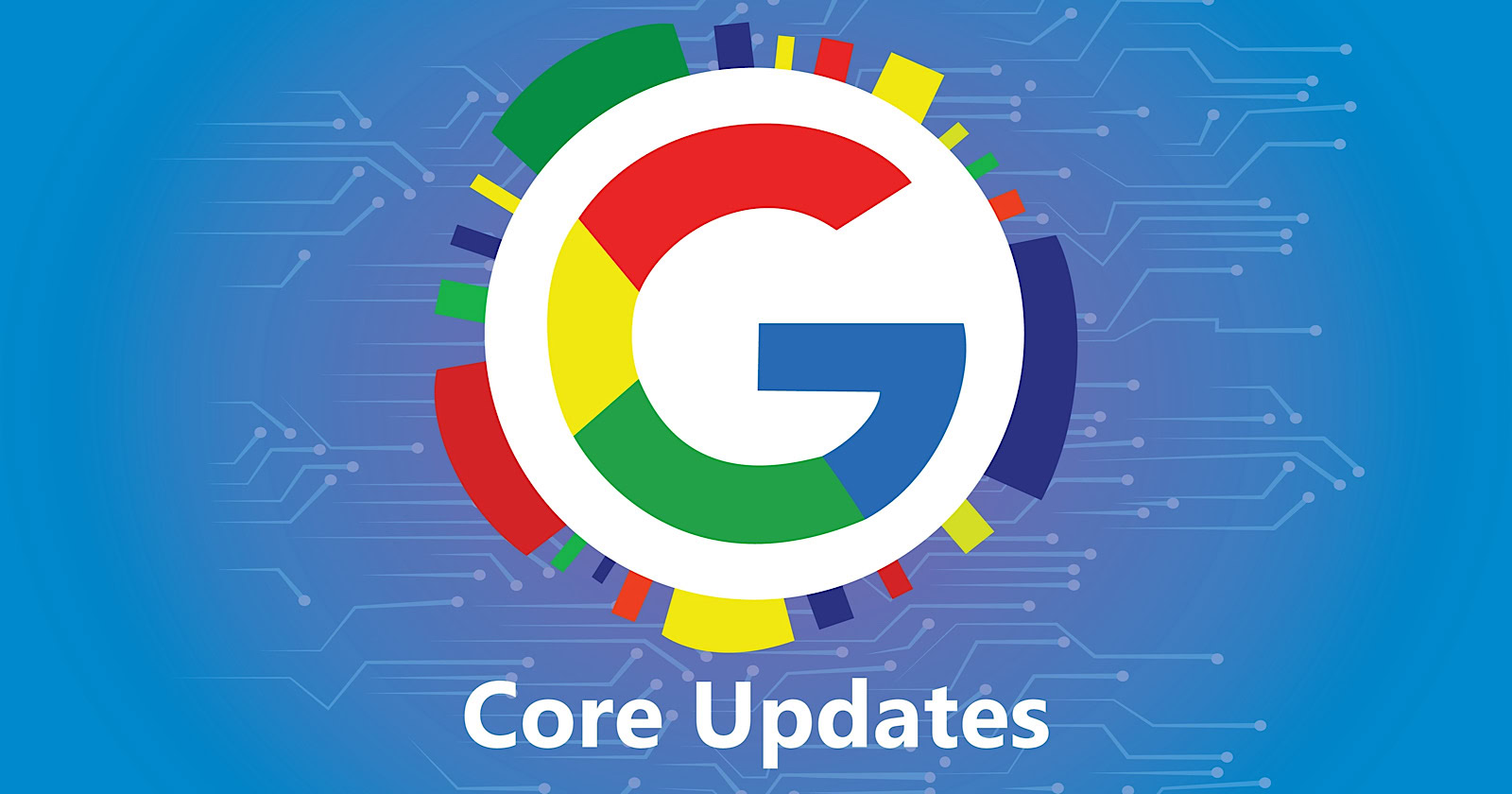
Google has officially completed its March 2024 Core Update, ending over a month of ranking volatility across the web.
However, Google didn’t confirm the rollout’s conclusion on its data anomaly page until April 26—a whole week after the update was completed on April 19.
Many in the SEO community had been speculating for days about whether the turbulent update had wrapped up.
The delayed transparency exemplifies Google’s communication issues with publishers and the need for clarity during core updates
Google March 2024 Core Update Timeline & Status
First announced on March 5, the core algorithm update is complete as of April 19. It took 45 days to complete.
Unlike more routine core refreshes, Google warned this one was more complex.
Google’s documentation reads:
“As this is a complex update, the rollout may take up to a month. It’s likely there will be more fluctuations in rankings than with a regular core update, as different systems get fully updated and reinforce each other.”
The aftershocks were tangible, with some websites reporting losses of over 60% of their organic search traffic, according to data from industry observers.
The ripple effects also led to the deindexing of hundreds of sites that were allegedly violating Google’s guidelines.
Addressing Manipulation Attempts
In its official guidance, Google highlighted the criteria it looks for when targeting link spam and manipulation attempts:
- Creating “low-value content” purely to garner manipulative links and inflate rankings.
- Links intended to boost sites’ rankings artificially, including manipulative outgoing links.
- The “repurposing” of expired domains with radically different content to game search visibility.
The updated guidelines warn:
“Any links that are intended to manipulate rankings in Google Search results may be considered link spam. This includes any behavior that manipulates links to your site or outgoing links from your site.”
John Mueller, a Search Advocate at Google, responded to the turbulence by advising publishers not to make rash changes while the core update was ongoing.
However, he suggested sites could proactively fix issues like unnatural paid links.
“If you have noticed things that are worth improving on your site, I’d go ahead and get things done. The idea is not to make changes just for search engines, right? Your users will be happy if you can make things better even if search engines haven’t updated their view of your site yet.”
Emphasizing Quality Over Links
The core update made notable changes to how Google ranks websites.
Most significantly, Google reduced the importance of links in determining a website’s ranking.
In contrast to the description of links as “an important factor in determining relevancy,” Google’s updated spam policies stripped away the “important” designation, simply calling links “a factor.”
This change aligns with Google’s Gary Illyes’ statements that links aren’t among the top three most influential ranking signals.
Instead, Google is giving more weight to quality, credibility, and substantive content.
Consequently, long-running campaigns favoring low-quality link acquisition and keyword optimizations have been demoted.
With the update complete, SEOs and publishers are left to audit their strategies and websites to ensure alignment with Google’s new perspective on ranking.
Core Update Feedback
Google has opened a ranking feedback form related to this core update.
You can use this form until May 31 to provide feedback to Google’s Search team about any issues noticed after the core update.
While the feedback provided won’t be used to make changes for specific queries or websites, Google says it may help inform general improvements to its search ranking systems for future updates.
Google also updated its help documentation on “Debugging drops in Google Search traffic” to help people understand ranking changes after a core update.
Featured Image: Rohit-Tripathi/Shutterstock
FAQ
After the update, what steps should websites take to align with Google’s new ranking criteria?
After Google’s March 2024 Core Update, websites should:
- Improve the quality, trustworthiness, and depth of their website content.
- Stop heavily focusing on getting as many links as possible and prioritize relevant, high-quality links instead.
- Fix any shady or spam-like SEO tactics on their sites.
- Carefully review their SEO strategies to ensure they follow Google’s new guidelines.
SEO
Google Declares It The “Gemini Era” As Revenue Grows 15%

Alphabet Inc., Google’s parent company, announced its first quarter 2024 financial results today.
While Google reported double-digit growth in key revenue areas, the focus was on its AI developments, dubbed the “Gemini era” by CEO Sundar Pichai.
The Numbers: 15% Revenue Growth, Operating Margins Expand
Alphabet reported Q1 revenues of $80.5 billion, a 15% increase year-over-year, exceeding Wall Street’s projections.
Net income was $23.7 billion, with diluted earnings per share of $1.89. Operating margins expanded to 32%, up from 25% in the prior year.
Ruth Porat, Alphabet’s President and CFO, stated:
“Our strong financial results reflect revenue strength across the company and ongoing efforts to durably reengineer our cost base.”
Google’s core advertising units, such as Search and YouTube, drove growth. Google advertising revenues hit $61.7 billion for the quarter.
The Cloud division also maintained momentum, with revenues of $9.6 billion, up 28% year-over-year.
Pichai highlighted that YouTube and Cloud are expected to exit 2024 at a combined $100 billion annual revenue run rate.
Generative AI Integration in Search
Google experimented with AI-powered features in Search Labs before recently introducing AI overviews into the main search results page.
Regarding the gradual rollout, Pichai states:
“We are being measured in how we do this, focusing on areas where gen AI can improve the Search experience, while also prioritizing traffic to websites and merchants.”
Pichai reports that Google’s generative AI features have answered over a billion queries already:
“We’ve already served billions of queries with our generative AI features. It’s enabling people to access new information, to ask questions in new ways, and to ask more complex questions.”
Google reports increased Search usage and user satisfaction among those interacting with the new AI overview results.
The company also highlighted its “Circle to Search” feature on Android, which allows users to circle objects on their screen or in videos to get instant AI-powered answers via Google Lens.
Reorganizing For The “Gemini Era”
As part of the AI roadmap, Alphabet is consolidating all teams building AI models under the Google DeepMind umbrella.
Pichai revealed that, through hardware and software improvements, the company has reduced machine costs associated with its generative AI search results by 80% over the past year.
He states:
“Our data centers are some of the most high-performing, secure, reliable and efficient in the world. We’ve developed new AI models and algorithms that are more than one hundred times more efficient than they were 18 months ago.
How Will Google Make Money With AI?
Alphabet sees opportunities to monetize AI through its advertising products, Cloud offerings, and subscription services.
Google is integrating Gemini into ad products like Performance Max. The company’s Cloud division is bringing “the best of Google AI” to enterprise customers worldwide.
Google One, the company’s subscription service, surpassed 100 million paid subscribers in Q1 and introduced a new premium plan featuring advanced generative AI capabilities powered by Gemini models.
Future Outlook
Pichai outlined six key advantages positioning Alphabet to lead the “next wave of AI innovation”:
- Research leadership in AI breakthroughs like the multimodal Gemini model
- Robust AI infrastructure and custom TPU chips
- Integrating generative AI into Search to enhance the user experience
- A global product footprint reaching billions
- Streamlined teams and improved execution velocity
- Multiple revenue streams to monetize AI through advertising and cloud
With upcoming events like Google I/O and Google Marketing Live, the company is expected to share further updates on its AI initiatives and product roadmap.
Featured Image: Sergei Elagin/Shutterstock
SEO
brightonSEO Live Blog

Hello everyone. It’s April again, so I’m back in Brighton for another two days of Being the introvert I am, my idea of fun isn’t hanging around our booth all day explaining we’ve run out of t-shirts (seriously, you need to be fast if you want swag!). So I decided to do something useful and live-blog the event instead.
Follow below for talk takeaways and (very) mildly humorous commentary. sun, sea, and SEO!
-
SEARCHENGINES7 days ago
Daily Search Forum Recap: April 19, 2024
-

 WORDPRESS6 days ago
WORDPRESS6 days ago13 Best HubSpot Alternatives for 2024 (Free + Paid)
-

 WORDPRESS7 days ago
WORDPRESS7 days ago7 Best WooCommerce Points and Rewards Plugins (Free & Paid)
-

 MARKETING6 days ago
MARKETING6 days agoBattling for Attention in the 2024 Election Year Media Frenzy
-

 MARKETING6 days ago
MARKETING6 days agoAdvertising in local markets: A playbook for success
-

 SEO7 days ago
SEO7 days agoGoogle Answers Whether Having Two Sites Affects Rankings
-

 SEARCHENGINES6 days ago
SEARCHENGINES6 days agoGoogle Core Update Flux, AdSense Ad Intent, California Link Tax & More
-

 AFFILIATE MARKETING6 days ago
AFFILIATE MARKETING6 days agoGrab Microsoft Project Professional 2021 for $20 During This Flash Sale


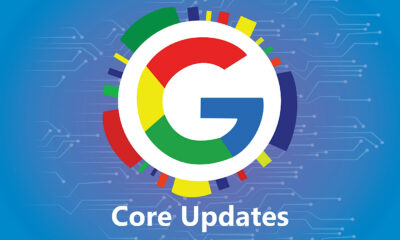

![The Current State of Google’s Search Generative Experience [What It Means for SEO in 2024] person typing on laptop with](https://articles.entireweb.com/wp-content/uploads/2024/04/The-Current-State-of-Googles-Search-Generative-Experience-What-It.webp-400x240.webp)
![The Current State of Google’s Search Generative Experience [What It Means for SEO in 2024] person typing on laptop with](https://articles.entireweb.com/wp-content/uploads/2024/04/The-Current-State-of-Googles-Search-Generative-Experience-What-It.webp-80x80.webp)









